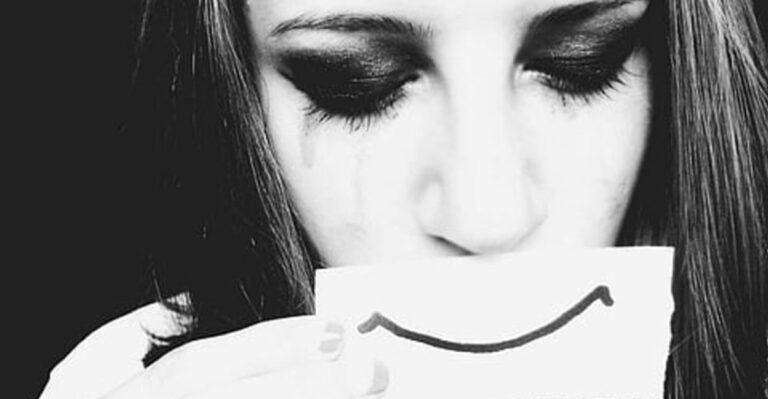A 16 Step Survival Guide Through Self-Loathing
The Definition Of Self-Loathing
According to the self-loathing definition, it is the hatred of yourself. But, it’s not that simple: it’s also a deeply rooted belief that you’re not enough and that you’re not worthy of self-love.
As a self-loathing person, you’re always in search of your new flaws. You’re overwhelmed with self-doubts and negative thoughts that you simply don’t have the strength to get rid of.
You think of yourself as worthless, inadequate, and insufficient. You don’t know what to do with your life. You’re convinced that all of your self-hatred is justified and your self-concept is pretty much ruined.
5 Unexpected Sources Of Self-Loathing
Self-hate always has its reasons, even though you don’t have to necessarily identify them right away. To defeat it, you have to get to the bottom of your condition.
You have to find its root causes and the starting point of your self-critical nature.
Past trauma

In most cases, negative thoughts connected with self-loathing don’t appear out of the blue.
According to psychiatry and psychology, this state is usually caused by deeply rooted past traumas you might not even be aware of.
Feeling this way is usually tightly connected with negative childhood experiences. Almost every self-loathing person has spent their entire life listening to criticism.
Ever since you can remember, you were never good enough for your parents. Maybe they compared you to a more successful sibling, or they never believed in you.
On the other hand, your romantic history could have provoked self-loathing as well. If you were emotionally neglected in the past by someone you cared for deeply, you might have begun to blame yourself for that.
Either way, what’s important for you to realize is that each one of our experiences shapes us into the people we are today.
You might be convinced that you forgot about a certain trauma but trust me–they’re all deeply inscribed on your mental health.
People pleasing

No matter what you do, you can never please everyone. So, why bother trying?
It’s about time you realize that your people-pleasing traits brought you to this condition in the first place.
The process is actually pretty simple: you do your best for someone to like you; you go out of your way to please them, and, finally, you don’t get the reaction you were expecting.
They don’t appreciate you the way they should, nor do they love you, despite all of your efforts. As a result, you start to blame yourself for it.
You don’t see the people around you as too demanding. You don’t consider them ungrateful and inconsiderate.
Instead, you loath yourself for not being able to meet their unrealistic expectations. Sounds crazy, I know.
However, if you do some introspection, you’ll begin to admit that this has been going on inside your head for years.
Hypercritical surroundings

Whether we like to admit it or not, others have a significant impact on us. After all, we’re all social beings who live in a symbiotic relationship with other people.
Therefore, their influence is inevitable. This especially goes for our loved ones.
You see, your self-critical thoughts and feelings have a source.
If you’ve spent most of your life around people who made it clear that they don’t think much of you, your self-esteem never had a chance to grow.
If you’re surrounded by those who keep on diminishing your self-worth and who keep on telling you that nothing you ever do is good enough, the consequences will be devastating.
Knowing all of this, you can’t help but wonder: “Do I hate myself because of my hypercritical surroundings?”
To be clear: I’m not trying to free you from responsibility and put the entire blame for your state on someone else.
However, the truth is that self-criticism sometimes appears as a result of disapproval.
Perfectionism

The next possible cause of self-loathing is the desire to be perfect. It doesn’t matter if others have imposed this aspiration on you, or you’re the one who is chasing perfectionism on your own.
The bottom line is the same: every time you notice that your life is not spotless and that you’re not flawless–you begin with self-hatred.
With time, you’ve adopted the idea that only being the best is good enough. This mindset has inspired you to become better, which is awesome.
However, on the other hand, it has also taken a negative toll on your emotional and mental health. Basically, you beat yourself up every time you don’t meet your high standards.
Every time you notice an imperfection in your character or whenever your life doesn’t look exactly the way you want it to–you think of yourself as a failure.
Social standards

Comparing yourself to others is a big no-no unless you want to end up with loads of self-hate and self-doubt. However, that is exactly what you do.
When you look around, it seems like everyone has it better than you. Your high school friends are successful business people; some of them are traveling around the world, the next two have built a family, and so on.
Either way, they all look fantastic and are apparently living their best lives.
At least, that is what you have the chance to see all over their social media profiles or when you run into them. You see your friends and strangers who always have a smile on their faces.
Then you take a closer look at your life with all of its imperfections. You look at yourself in a mirror; you write your achievements on a piece of paper, and what do you conclude?
Well, you’re miserable compared to them. Consequently, your feelings of worthlessness trigger a depressive episode.
All of a sudden, your inner critic wakes up as you realize that you’ll never be able to meet these social standards. You’ll never be as attractive, as smart, or as successful as what is expected of you.
7 Symptoms Of A Self-Loathing Mindset
Well, to do something about your self-hate, first of all, you have to be sure that you’re a self-loathing person. Now that you’re confident about the meaning of self-loathing and its causes, it’s time to look at the symptoms.
Self-criticism

When you define self-loathing, you’ll connect it with self-criticism and negative self-talk that influences your mental health negatively.
You’ve spent most of your life thinking negatively about yourself, your actions, and your choices.
Whatever you do–someone else could have done it better. Whatever you accomplish–you could have done better.
Sounds familiar, right? No matter what happens in your life, you’re always to blame for all the negative consequences, which eventually awakened your desire for self-harm.
When you come to think about it, you don’t treat others this way. When someone else makes a mistake, you are ready to stop them from feeling responsible.
However, when it comes to your life, you suddenly turn into the biggest critic.
Tough self-love

When you use tough love on someone, you don’t let them get away with mistakes. You know what they are capable of, and you don’t allow them to do anything below their real abilities.
Basically, you act harshly and treat them as if you don’t love them to inspire them to do better. You’re a jerk to them so they can take responsibility for their lives and so you could help them in the long run.
Well, in your case, you’re not applying the concept of tough love to your relationship partner, a friend, or a sibling–you’re doing it to yourself.
Even though this kind of approach can help certain scenarios, it has thrown you into the abyss of despair and self-hating in your situation.
The burden of social media

Today, the most common symptom of self-loathing is seen through someone’s behavior on social media. Facebook, Instagram, and Snapchat don’t serve you to stay in touch with your friends or for business purposes.
Instead, they affect you in numerous negative ways. You feel this heavy burden every time you open your News Feed. You feel the need to impress all those strangers on your phone, and you’ve stopped enjoying life.
You’ve become obsessed with the impression your accounts leave. You spend hours and hours looking at other people’s photos and comparing yourself to them.
Apparently, your life is not as impressive as theirs. You don’t have enough money, you don’t travel as much as you would like, and you don’t look as awesome as your followers.
Not meant to be loved

Self-loathing people are convinced that they’re not meant to be loved. After all, if you can’t force yourself to love the person you are, what can you expect from others?
Naturally, this couldn’t be further from the truth. However, this is how your mind works: you think that you’re destined to die alone, and nobody gives a damn about you.
I’m not only talking about romantic love here. You don’t think that a single person in your surroundings exists who genuinely cares about you.
Even worse, deep down, you believe that you are not worthy of anyone’s affection. You’re convinced that there is absolutely nothing to love about you.
You don’t deserve anyone’s attention, time, or effort. Why? Because you’re utterly worthless.
If this is something you can relate to, you not only suffer from low self-esteem; you’re also guilty of self-hatred.
Envy

I hate to break it to you, but if you’re a self-loather, the chances are that you’re an envious person as well.
Instead of working on yourself, you’re focused on other people’s accomplishments. Everyone seems to be more successful than you, and that eats you alive.
But, let me ask you a question: how would it affect you if they had it worse?
Would you magically have enough money if they lose all of theirs? Would your career flourish the moment theirs fails? Would you have a happy love life if theirs were miserable?
You and I both know the answer. So how do their accomplishments impact you? That’s right; they don’t.
I’m asking you to say “no” to envy. Trust me–it’s not hurting anyone but you.
Fear of failure

“And you ask, ‘What if I fall?’ Oh, but my darling, ‘What if you fly?’” – Erin Hanson
What prevents you from achieving greatness is your fear of failure. You avoid taking any risks since you don’t believe in yourself.
Your self-doubts don’t allow you to think that you’ll succeed. So, you think it’s much better not to try at all. You end up setting low effort goals just to avoid the possibility of failing.
Well, you’re not alone in this because nobody enjoys losing. However, failure is a part of life, whether we like it or not.
Constant apologizing

The last but certainly not the least important or common symptom of self-hatred is the constant need to apologize.
Look, saying that you’re sorry when you do someone wrong is a sign that you’re a good person who has manners.
Nevertheless, there is a great difference between being polite and between apologizing all the time for the slightest inconvenience.
By doing that, you’re showing the rest of the world that you consider yourself to be guilty of everything that happens.
If someone punches you, you would probably apologize because your face got in the way of their fist.
What I’m trying to tell you is that your self-hatred has made you walk on eggshells around others without demanding any respect in return.
4 Foolproof Ways To Overcome Self-Loathing
Luckily for you, it is possible to defeat these feelings of self-loathing and change your self-concept. Here is a step-by-step guide on how to do it the healthiest way possible.
Self-forgiveness

First and foremost, you have to embrace the art of self-forgiveness. Remember that we all make mistakes, so why would you take yours so seriously?
This doesn’t mean that you shouldn’t learn from your bad choices–you just need to stop beating yourself up because of them.
Forgive yourself for all the times you broke your own heart, for every toxic person you’ve let near you, and for all the missed opportunities.
Moreover, forgive yourself for all the times you didn’t respect, appreciate, and love yourself enough.
Letting go of the past

Another thing you must stop holding on to is your history. This is very much connected to self-forgiveness.
Often enough, your self-loathing sources from the things you did or didn’t do in your past.
Maybe you can’t stand looking at yourself every time you remember how you allowed yourself to be treated.
Maybe you hate yourself for not taking a few chances years ago. Or maybe your self-hatred comes from the way you treated those who didn’t deserve it.
Well, all of this means that you’re self-conscious, which is always a good thing. However, you won’t achieve anything if you hold on to the past.
You can’t change anything about it, so what’s the point of overthinking? Please, do your best to let go of the past.
Be brave enough to jump into your future because it’s the only thing you can actually influence.
Detoxing your social circle

I don’t care if your parents, siblings, or childhood friends are the ones who make you feel like you’re not worthy–you MUST cut them off.
If it’s necessary, try finding another job or even move to another city to move away from everyone who feeds your insecurities.
Trust me: these are not overly radical changes. It is something that has to be done.
Your mental health has to come first if you want any kind of improvement.
Besides, you’re already aware that other people’s opinions impact your sense of value, so you have to get rid of everyone who spreads negativity.
Detox your social circle and surround yourself with those who will bring nothing but positivity to your life, and be with people who will help you find yourself and give you a hand to rise from the bottom, instead of sending you there.
Self-compassion

The next step in the process of overcoming self-loathing is all about self-compassion. I bet you know what I’m talking about.
After all, you’re an empath when it comes to others, aren’t you? You understand their point of view, and you find justification for their lousy actions.
Basically, you don’t think of them as bad people for making one wrong choice.
You’re like that with everyone, not just your loved ones. You possess empathy, even for people you don’t know.
To be precise, you’re like that with everyone besides yourself. On the contrary, you keep on judging yourself for every little mistake you make.
It’s like you’re only hard on the person you should love the most. When it comes to you, there are no excuses. You’re the only person in the world who is not allowed to do anything wrong.
Well, that has to change ASAP. For starters, try thinking of yourself as a friend.
What advice would you give to your loved one if they were in a similar situation to you? I bet that you would encourage them and point out all of their positive qualities and good sides.
So, what’s stopping you from treating yourself the same way? Don’t be your own inner critic.
To Wrap Up:

I know it would be best if you could snap your fingers and ditch the self-loathing for good. Well, sadly, things don’t always go as smoothly as you expect them to.
The truth is that you’ve spent years despising yourself. So, you can’t change your entire mindset overnight.
However, I assure you that you will make it. All you have to do is be persistent and never give up!






